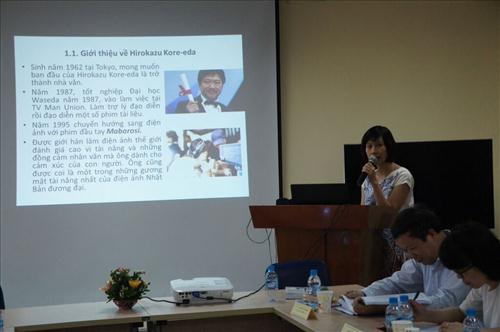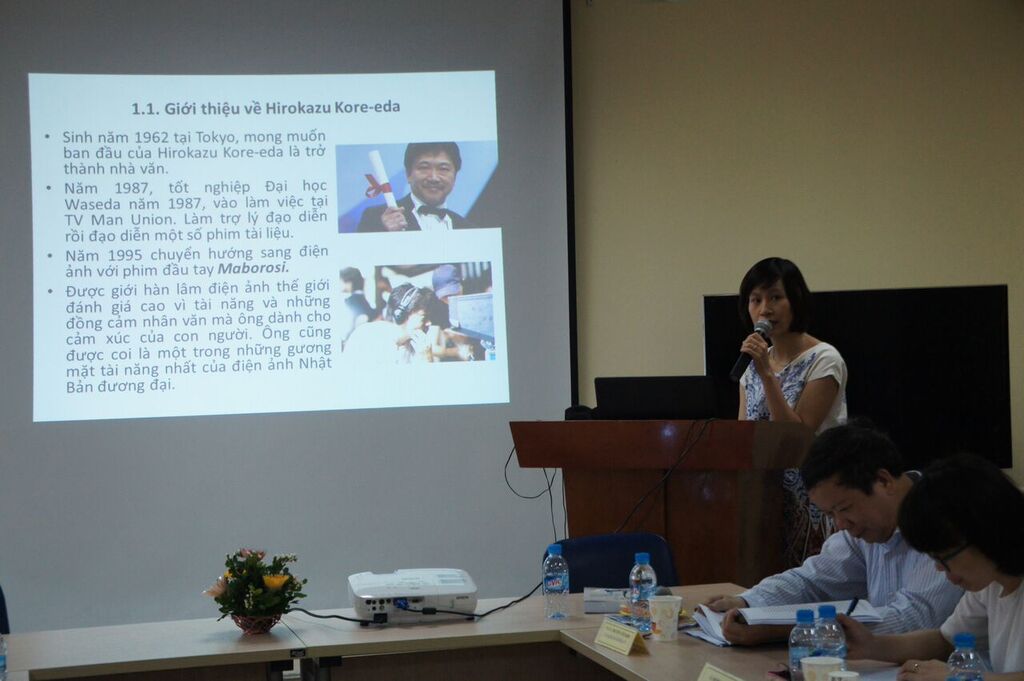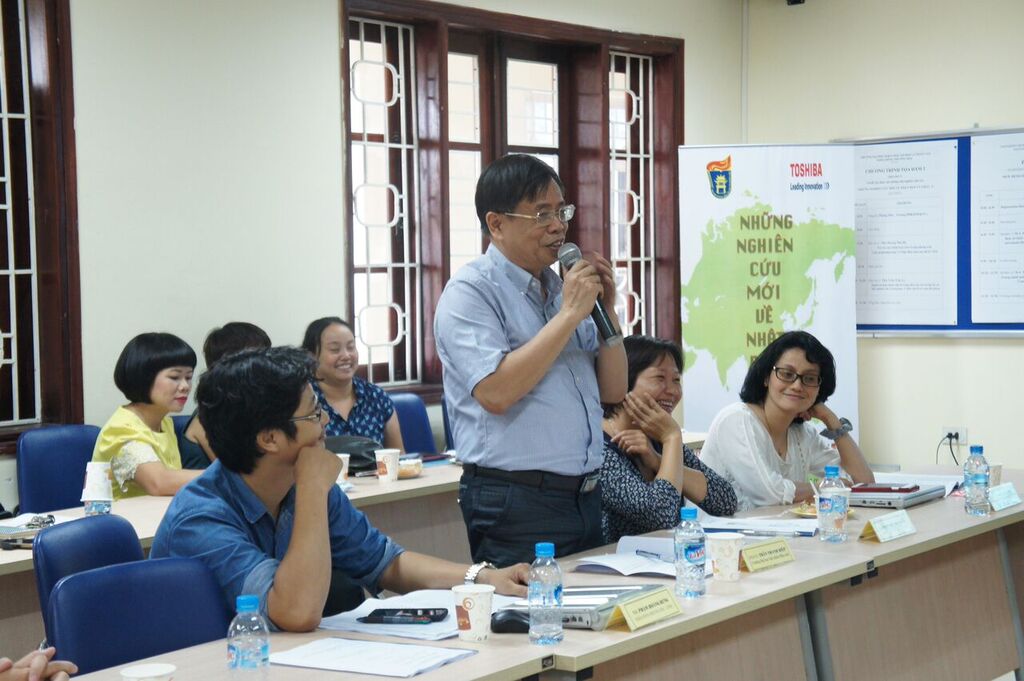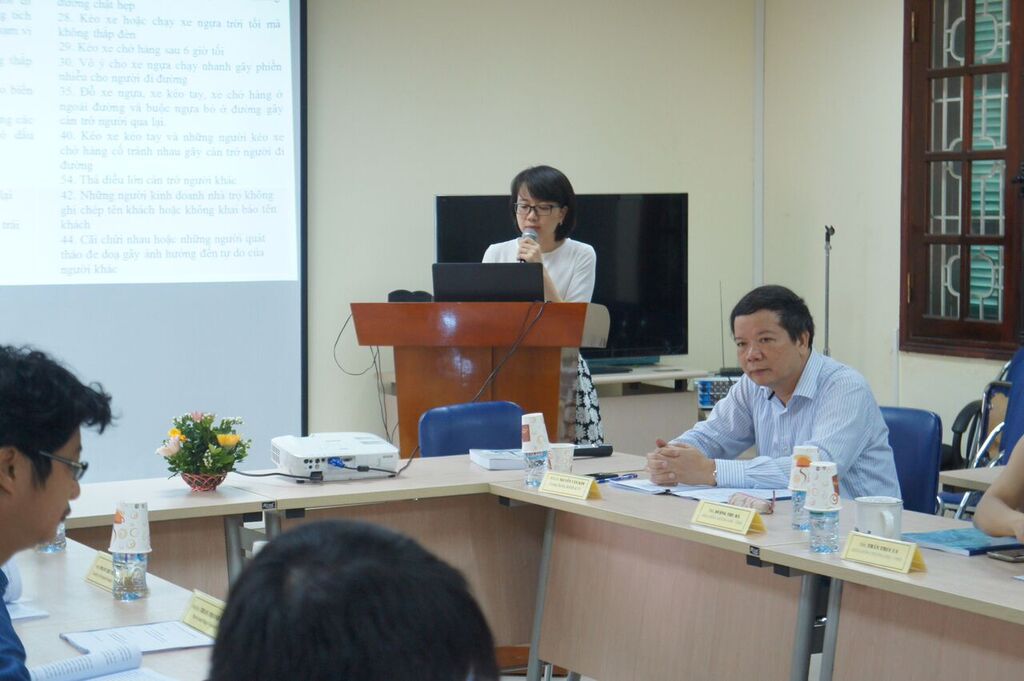
The seminar is a professional discussion revolving around the main reports of two young researchers of the Faculty of Oriental Studies.
The author group, MSc. Tran Truc Ly (Department of Chinese Studies) and Dinh My Linh (Institute of Cultural Studies, Vietnam Academy of Social Sciences), Vu Minh Anh (TPD Center for Supporting and Developing Young Cinema Talents) reported on the topic "Adults as the Center of Social Interactions, a Cinematic Case Study of Hirokazu Kore-eda””. The authors commented that the characters in Kore-eda's films carry crisis issues that are compatible with the psychology of adulthood in the life cycle, facing conflicting conflicts revolving around emotions and making a living. Facing human conflicts in the context of modern society, which are problems that are difficult to solve satisfactorily, author Kore-eda chose for himself a style imbued with humanistic spirit, simplicity and a neutral, comprehensive perspective. With a neutral point of view, not dogmatic or extreme, always delving into the psychological nooks and crannies of all types of people but also not choosing any answers to the difficult problems that every adult must face, the cinematic style that Kore-eda chose is also relatively mixed, diverse, and flexible. When considered in relation to Kore-eda's social views, the two main points in his style can be mentioned as artistic techniques to peel off each deep psychological layer and techniques to ease extreme tension, to help for the work, consistent with the perspective, always maintaining a state of balance, humanity and sparkling hope. Such a way of making films makes Kore-eda's cinema address the same basic issues of adult human beings in a modern context as many other films on the international cinema scene, but he still leaves his own mark in the hearts of the audience, because the filmmaker not only gives the audience an objective, diverse view, but also expresses his own humanistic, optimistic spirit.

MSc. Tran Truc Ly represented the group to present the topic "Adults as the center of social interactions, a case study of Hirokazu Kore-eda's cinema".
Commenting on the report, Associate Professor Dr. Tran Thanh Hiep (University of Theater and Cinema) said: This research topic for the research group Tran Truc Ly, Dinh My Linh, Vu Minh Anh is not only an advantage but also a big challenge. Researching Hirokazu Kore-eda's cinema to see adults as the center of social interactions and its problems is a smart choice. Implementing research on this topic requires the group of authors not only to have knowledge about culture and related scientific fields but also to have an understanding of cinema. Using Hirokazu Kore-eda's cinema as material, the authors will not be able to reach their destination without the necessary knowledge and understanding of cinema. When reading the scientific report, Associate Professor Dr. Tran Thanh Hiep assessed this as an elaborate, attractive scientific report, containing very valuable and useful findings when we learn about culture in today's flat world.

Associate Professor, Dr. Tran Thanh Hiep (University of Theater and Cinema) commented
Report of MSc. Duong Thu Ha (Department of Japanese Studies) with the topic "The role of Ishiki kaii jōrei in the “civilization” movement in Japan in the second half of the 19th century”. According to the author, Ishiki kaii jōrei is one of the top-down policies that the Meiji government used to guide the Japanese people to civilization. Unlike other policies, this law is the first law to regulate and punish behaviors related to customs, habits, and daily lifestyles of the people. Although the prohibitions in this law are seemingly very small things, the government at that time was aware that if not seriously corrected, it would leave a special impression that would make foreigners judge Japan as an uncivilized country, a "barbaric" country. The promulgation and implementation of Ishiki kaii jōrei nationwide brought about the first result of improving Japan's image in the eyes of Westerners and creating the premise for Japan to become a world-leading country in terms of consciousness as it is today.

MSc. Duong Thu Ha (Faculty of Oriental Studies - University of Social Sciences and Humanities) presented a paper
As the main commentator for the report, Associate Professor Dr. Phan Hai Linh (University of Social Sciences and Humanities) commented: Enlightenment is a topic that has been studied a lot in Japan and in Vietnam. However, analyzing the role of the Regulations prohibiting intentional and unintentional violations, called Ishiki kaii jorei (hereinafter referred to as Prohibition Regulations) is an issue that has not yet received attention in Vietnam. Therefore, this report is meaningful to introduce to Vietnamese readers about these regulations, including the context of promulgation of the regulations, basic content and role of these regulations in Japan during the Enlightenment period. Associate Professor Dr. Phan Hai Linh also suggested that the author should analyze the views of researchers on the same issue, on that basis, give the author's opinion, such as: Is the Prohibition Regulation proposed in the contemporary context appropriate? In what points is it appropriate and in what points is it inappropriate?
The third seminar is scheduled to be held on September 26, 2015.
Author:Nguyen Thi Thu Huong
Newer news
Older news